LA SERIGRAFÍA MÁS GRANDE DEL MUNDO VISITA EL PARLAMENTO DE LA UE EN BRUSELAS
13.10.2025
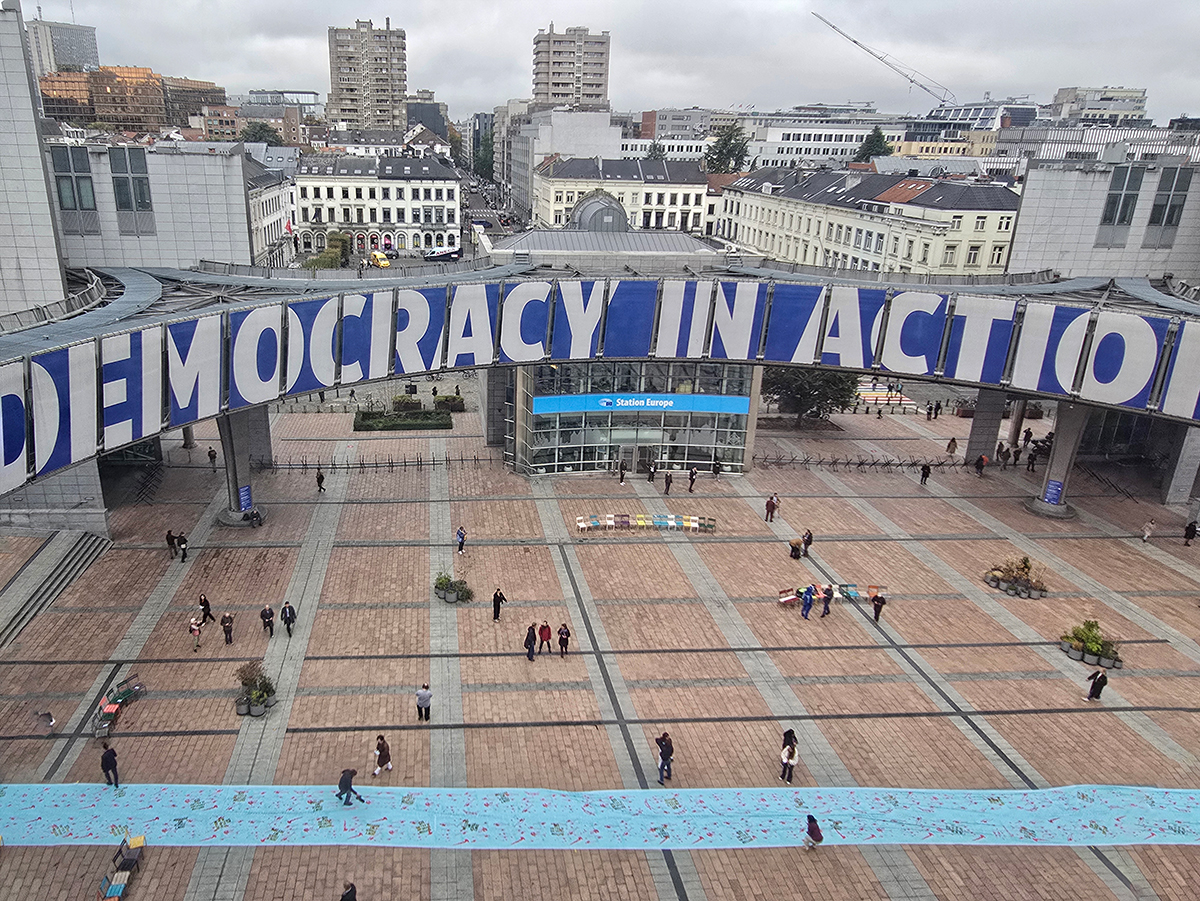
⬆️ The Net ilumina el Espace Lépold, frente al Parlamento Europeo. Es hora de recordar a los eurodiputados que no tiene por qué ser así. Foto de S.Staines.
-
Con motivo del inicio de Semana del Océano Los ciudadanos de la UE se reúnen en el Parlamento Europeo para expresar su preocupación por la inacción en las políticas oceánicas. No sirve de nada debatir estas cuestiones a puerta cerrada, es hora de que la recuperación de un océano sano sea LA cuestión de toda Europa.
Hoy, en Bruselas, la mayor impresión en pantalla del mundo de una red de arrastre de fondo, "La Red", ha sido desplegada por las manos de muchos ciudadanos de la UE preocupados en la explanada del Parlamento de la UE. El despliegue de "La Red" marca también otro año en el que la UE ha fracasado a la hora de impedir que la flota industrial de la UE destroce el lecho marino, masacre innecesariamente toneladas de vida marina y sobrepesca en las aguas costeras de todo el mundo.
El destino del Océano depende de todos nosotros.
Nuestras intervenciones dependen de su apoyo.
Ocean Rebellion exige a la UE que ponga fin a la pesca de arrastre de fondo de su flota pesquera antes de que sea demasiado tarde. Si la UE sigue sin hacer nada, nuestras aguas costeras (y las aguas costeras de todas las demás naciones que la flota de la UE pesca con redes de arrastre de fondo) serán destruidas.
¡¡¡¡¡¡¡¡¡⬆️ Liberar la red!!!!!!!!!
-
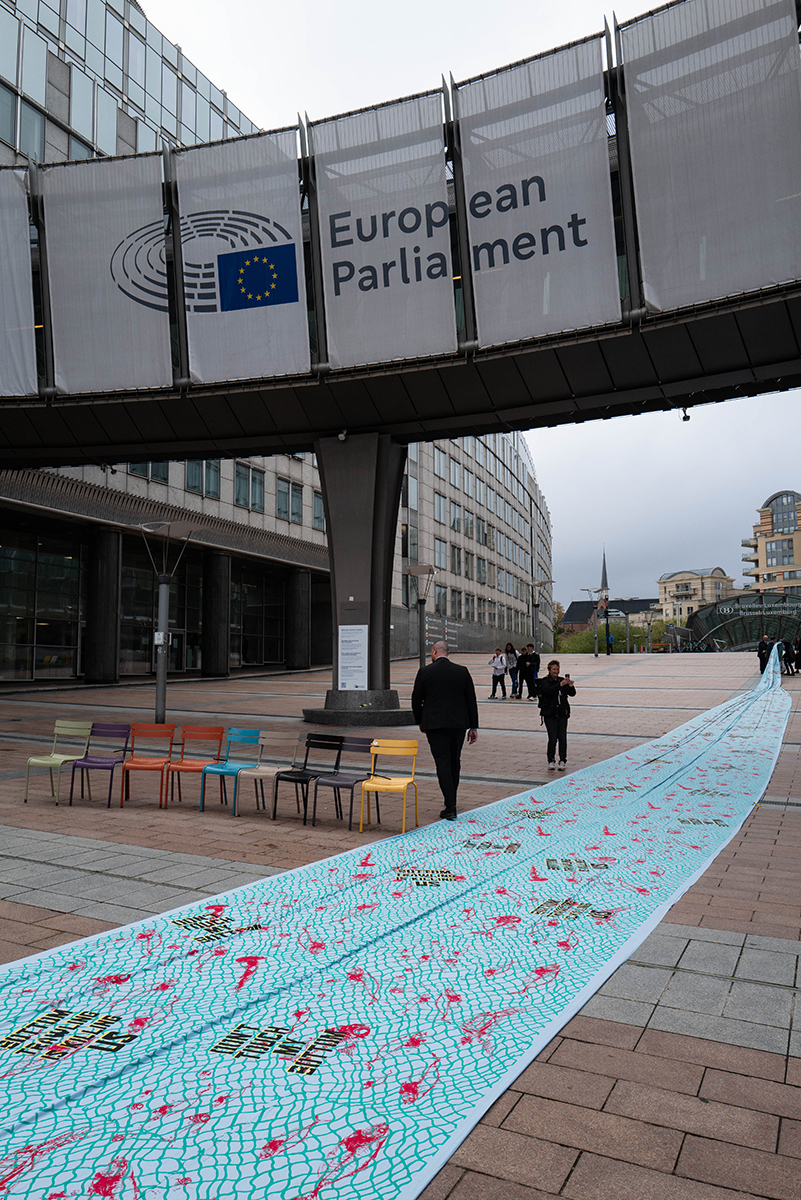
⬆️ Se tarda mucho en hacer una red larga, pero sólo se tarda unos segundos en sacarla, para enfado de la seguridad de la UE. Foto de João Daniel Pereira.
-
The Net" está hecha a mano y consta de más de 1.000 serigrafías individuales. Pero no se ha creado para batir récords mundiales. Su enorme tamaño de 150 metros no representa la longitud de una red de arrastre de fondo, sino la anchura de las fauces en su boca, que en realidad puede ser aún mayor. Tan anchas que diez jumbos podrían volar en su interior (Oceanográfico). Estas enormes redes de arrastre de fondo se lastran y arrastran por el lecho marino destruyendo corales, algas y capturando toda la vida marina que encuentran a su paso. Lo más alarmante es que la pesca de arrastre de fondo se practica sistemáticamente en zonas marinas protegidas de toda la UE. Esto significa que innumerables tortugas marinas, delfines, tiburones y peces más pequeños son asfixiados por la codicia de la pesca industrial de la UE (bajo la protección de los líderes de la UE) y luego simplemente arrojados por la borda. Esto representa 93% de todos los descartes en la UE; una vez que la pesca de arrastre de fondo sea historia, los descartes casi terminarán.
Entre 800 y 1.000 metros, la profundidad de una red de arrastre de fondo es aún mayor, una distancia tan larga que nos llevaría al menos dos meses imprimir una red que la representara.
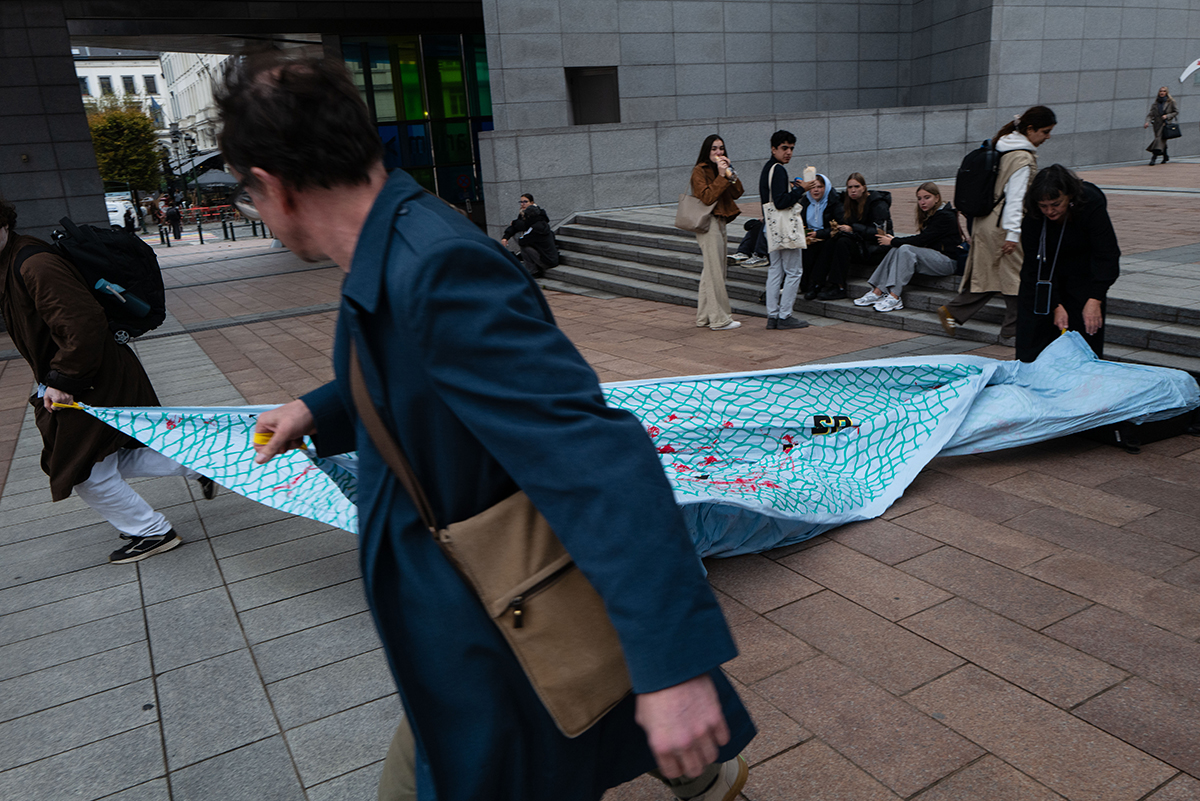
⬆️ Sale la red - ¡corre! Fotografía de João Daniel Pereira.
-
Locura económica
La idiotez y la hipocresía de la política económica de la UE son increíbles: la pesca de arrastre cuesta a los europeos de a pie hasta 11.000 millones de euros al año en subvenciones y emisiones de carbono, incluida la enorme huella de carbono de la alteración de los sedimentos (Millage, Mares prístinos) y por el arrasamiento de las praderas marinas, que son 35 veces mejores que la selva tropical a la hora de absorber el carbono asesino (Cliente Tierra). Las emisiones de la pesca de arrastre de fondo, por sí solas, equivalen a casi la mitad del total de las emisiones del transporte en EE.UU., y la suma total de las emisiones de la pesca de arrastre de fondo es equivalente a las emisiones de la aviación mundial. (Naturaleza).
Y lo más loco es que sin subvenciones, explícitas e implícitas, la pesca de arrastre de fondo ni siquiera sería rentable: los gobiernos europeos gastan directamente unos 1.300 millones de euros al año en subvencionar este desastre (National Geographic) y, sin embargo, los dirigentes de la UE están dispuestos a continuar con la pesca de arrastre en las Zonas Marinas Protegidas, reservadas para la supervivencia de al menos parte de la vida marina residual, mientras fingen que se preocupan por el Océano. Si se concedieran las mismas subvenciones y ayudas a los pescadores artesanales, en dinero y políticas fáciles de entender, la UE ayudaría a prosperar tanto a sus aguas costeras como a sus comunidades costeras. ¿Por qué es esto demasiado pedir a nuestras instituciones de la UE? ¿Será porque al fin y al cabo no son nuestras, sino de la industria pesquera?
¿No son responsables ante nosotros como contribuyentes de la UE?
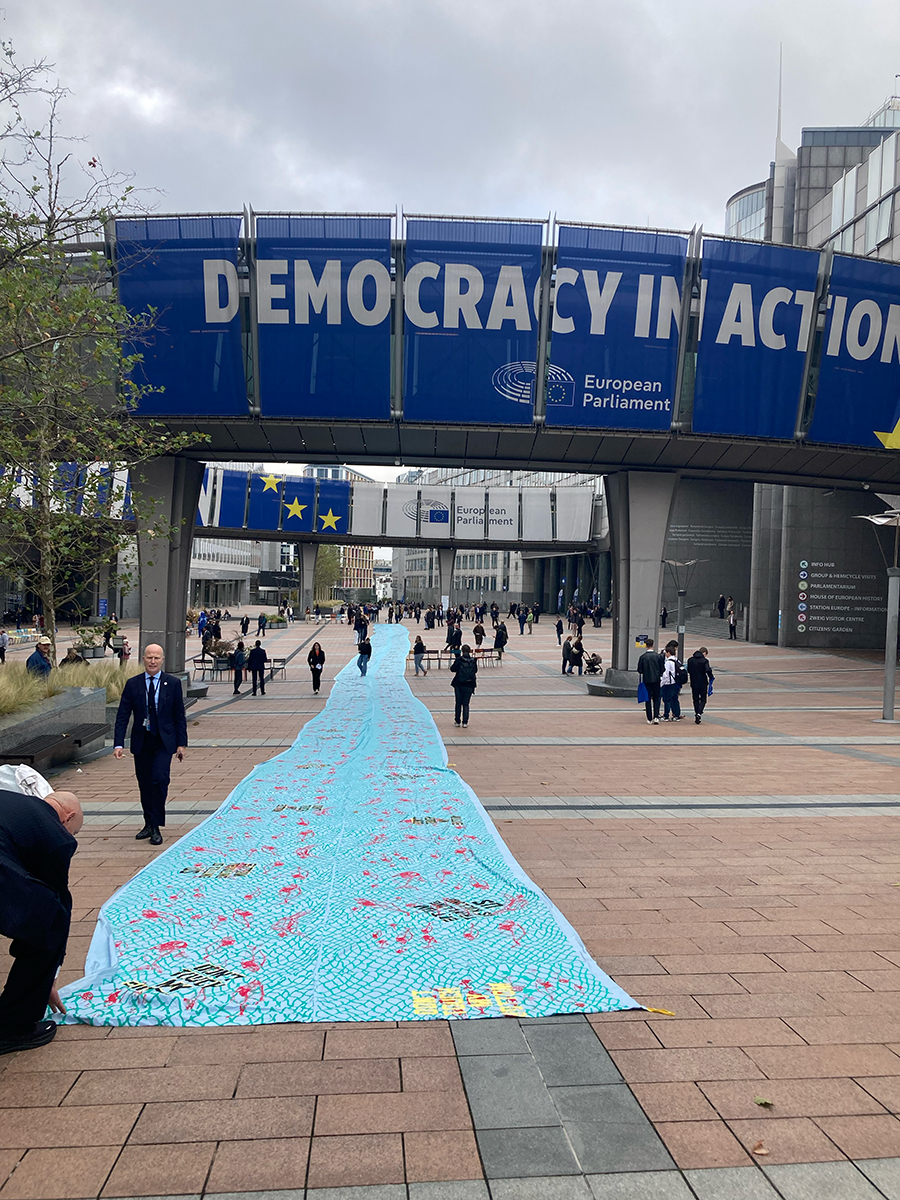
⬆️ Llega la seguridad. Esta vez no quieren detener la red, pero quieren que desaparezca. A diferencia de una verdadera red de arrastre de fondo, nuestra red no daña nada de lo que arrastramos, todo lo que hay debajo queda ileso. Foto de S. Staines.
-
Semana del Océano trata de cómo la UE puede liderar el mundo mostrando cómo puede prosperar el Océano si lo tratamos con cuidado.
Esto sólo ocurrirá si está respaldado por una acción real.
escrituras no palabras
La UE patrocina la destrucción del Océano. Las poblaciones de peces están más amenazadas que nunca. Y los Estados miembros de la UE permiten a sus flotas pesqueras maximizar su sobrepesca colonial "legal" en lugares donde los pescadores locales pasan hambre como consecuencia de ello, al tiempo que se muestran ultralaxos con la pesca ilegal y subvencionan por igual la pesca ilegal y la destructiva pesca "legal". También aumentan las emisiones de carbono al subvencionar y apoyar el uso de combustibles fósiles por parte de la industria pesquera. Si a esto añadimos su incapacidad para proteger realmente las zonas marinas protegidas (la flota pesquera de la UE pesca regularmente con redes de arrastre de fondo en zonas marinas protegidas), lo que nos queda es un un completo espectáculo de mentiras.
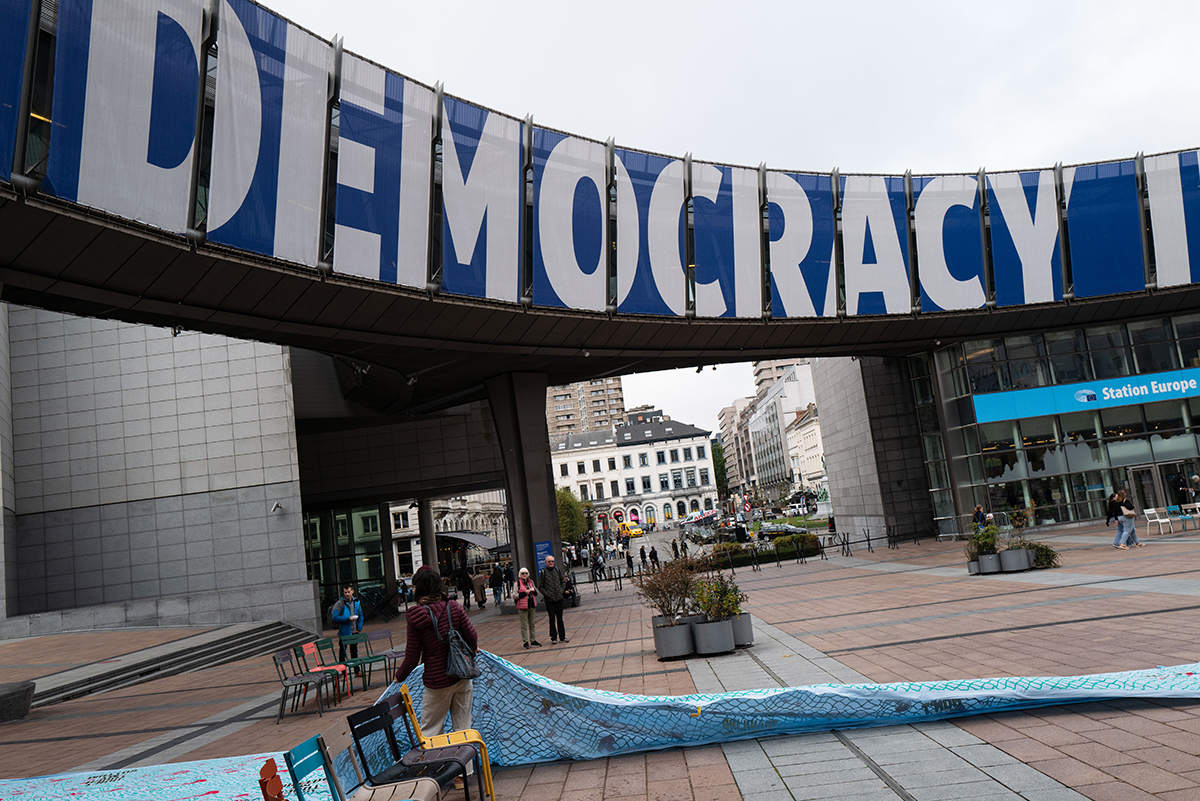
⬆️ Un enfoque más democrático de la pesca de arrastre de fondo significaría el fin de esta práctica pesquera destructiva: ¿por qué tiene que morir tanta vida marina para obtener tan pocos beneficios? Incluso perjudica a las pequeñas pesquerías, además de costar miles de millones en subvenciones. De hecho, los únicos que se benefician de la pesca de arrastre de fondo son los ya ricos propietarios de las pesquerías industriales. Foto de João Daniel Pereira.
-
Michael Collins de Ocean Rebellion dice:
"Imagínense el daño que causa una red del tamaño de diez aviones jumbo cuando se arrastra por el fondo marino. Atrapa todo lo que encuentra a su paso, destruye la vida marina y libera el carbono 'azul' allí almacenado. La pesca de arrastre de fondo emite más gases de efecto invernadero que la aviación. Son muchos gases".
Louis Dannatt también de Ocean Rebellion dice:
"La humanidad ha declarado la guerra a los peces y estamos ganando. El océano está tan esquilmado que las pequeñas comunidades pesqueras están al borde de la supervivencia y las zonas donde antes había abundancia ahora están vacías. Más de 100 millones de personas dependen de la pesca costera de subsistencia y de la pesca artesanal a pequeña escala para su alimentación diaria y su sustento, a menudo utilizando las mismas aguas vaciadas por los arrastreros de la UE. Es necesario que la UE marque el camino y ponga fin a la pesca industrial. Si se reduce la pesca en 80% en toda la UE, al mismo tiempo restauraremos nuestros mares y ayudaremos a las comunidades costeras revitalizando los métodos de pesca tradicionales y recompensando el cuidado de los océanos, y todo esto puede empezar por reorientar las subvenciones existentes."
Clive Russell, de Ocean Rebellion, dice:
"Exigimos a las instituciones de la UE y a todos los organismos no gubernamentales marinos que Diga la verdad sobre la pesca destructiva y poner fin al lavado verde de una industria sucia con mentiras de "sostenibilidad". Debemos acabar con la pesca de arrastre de fondo en todo el mundo, YA, junto con una transición justa para los trabajadores de la pesca desplazados."
Bridget Turgoose, añade:
"El océano puede recuperarse rápidamente, pero sólo si detenemos la carnicería ahora; en pocos años estos preciosos ecosistemas se regenerarán y las poblaciones de peces se estabilizarán. Sólo tenemos que dar una oportunidad a la vida, si no lo hacemos, no habrá más peces en el mar".
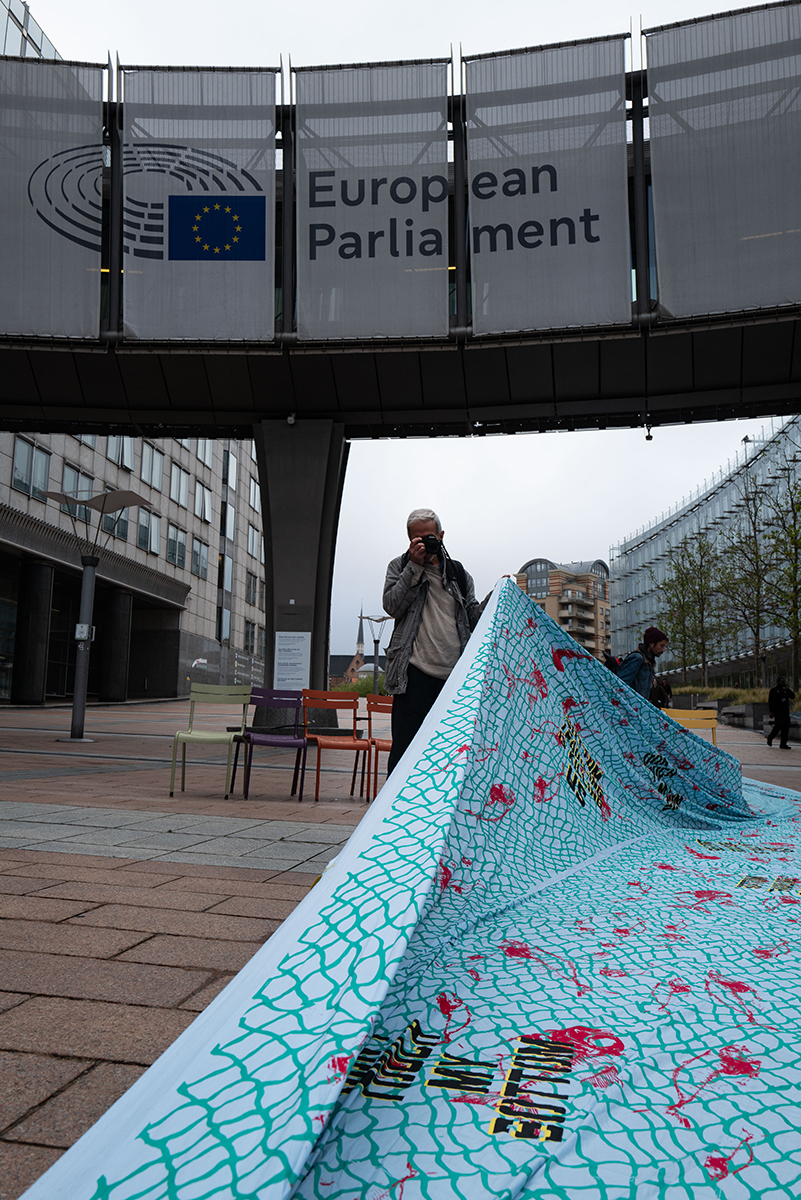
⬆️ La Red es muy fotogénica pero como imágenes recientes de la pesca de arrastre de fondo muestra que la pesca de arrastre de fondo real es muy diferente, es aterradoramente destructiva, derrochadora y horriblemente cruel. Fotografía de João Daniel Pereira.
-
La Rebelión del Océano exige:
Es hora de acabar con la pesca de arrastre de fondo. La UE puede empezar por proteger realmente las zonas marinas protegidas y prohibir la pesca de arrastre de fondo en toda su flota pesquera. Con un compromiso claro con los océanos, la UE se situará a la cabeza del mundo en la lucha contra la pesca de arrastre de fondo. pérdida de biodiversidad marina. Diciendo no a la industria pesquera mundial y sí a sus propios ciudadanos, la UE puede recuperar el asombro y el orgullo por sus mares. Que, con las subvenciones y políticas adecuadas, ayudarán a las comunidades costeras a convertirse en custodios de sus mares locales y a cuidar el Océano.
Puede leer el diagnóstico del profesor Chris Armstrong sobre los males actuales de la regulación aquí.
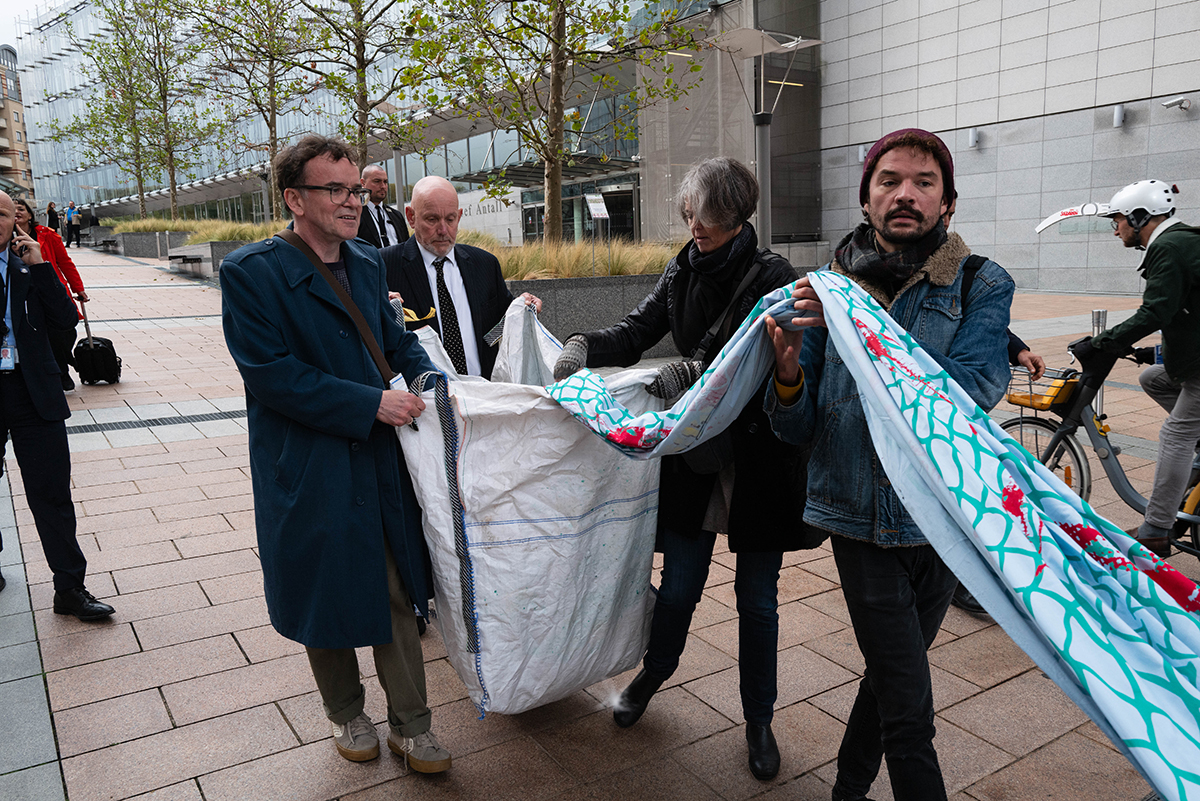
⬆️ Hora de irse, nos pidieron el DNI pero nos negamos, Adieu Brussels. Foto de João Daniel Pereira.